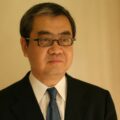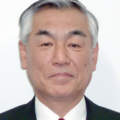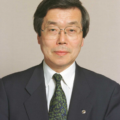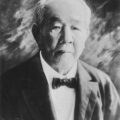HOW WE CAN SHARE HOPE WITH AFRICANS
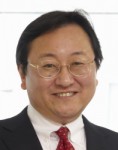
Hoshino Toshiya
Prime Minister Noda Yoshihiko made his diplomatic debut at the General Assembly of the United Nations in New York. In his address at the General Debate (September 23, 2011), Noda referred first and foremost to the Great East Japan Earthquake that struck the country just over six months prior, and on behalf of the Japanese people expressed his heartfelt gratitude for the friendship, solidarity and helping hands extended from around the world. He noted that university students gathered in the Kenyan capital of Nairobi in memory of Japanese victims of the earthquake and together sang the popular Japanese song known outside Japan as “Sukiyaki” (titled “Ue wo muite arukou [Look up when we walk]” in Japanese) saying they wished to deliver the song to the Japanese people. He also talked about poor children in Brazil who collected change and sent their contribution to Japan in a tin can. Referring to these stories as examples, Noda expressed appreciation for the “bonds between Japan and the international community.”
Noda emphasized in the speech that the Japanese government has been putting forth full efforts to restore and reconstruct the disaster-affected areas, and that steady progress is being made toward securing stable control of the situation at the Tokyo Electric Power Company’s Fukushima Daiichi Nuclear Power Plant. In other words, he emphasized to the world that Japan is nearing a return to a normal, safe state from the emergency climate that followed the earthquake. This is important for attracting the investment, business transactions and overseas tourists that have been shying away from Japan. Yet what should be commended here is the fact that Noda also clarified in the address, despite the country’s circumstances, that Japan will promptly contribute to international peace and safety, instead of limiting its efforts to cooperation with the international community in disaster risk reduction and nuclear power safety, which are directly linked to the country’s post-earthquake struggle.
Notably, the Prime Minister referred to deployment of destroyers and patrol aircraft for combating piracy off the coast of Somalia, and to continuing financial support for Afghanistan (approximately $5 billion of assistance over five years for which Japan expressed its commitment in 2009). He also announced what he called Japan’s “new commitments.” One is its support for the nation-building efforts in South Sudan, which became independent in July, as well as for the consolidation of peace in the region (including dispatch of personnel to the newly established United Nations Mission in the Republic of South Sudan [UNMISS]). Another commitment is further humanitarian aid to those suffering from drought in the Horn of Africa, including Somalia. Also included in Japan’s new commitments was its support for reform and democratization efforts of countries in the Middle East and North Africa, which are now undergoing a massive change referred to as the Arab Spring.
Apart from the scale, form and appropriateness of Japan’s support, Noda expressed Japan’s clear intent to provide timely support for issues in the international community, which the international community is closely watching. The Japanese government should naturally give top priority to restoration and reconstruction from its immense disaster, but considering the fact that since before the earthquake Japan had been inward-looking and derided as suffering from “Galápagos syndrome” despite its outstanding technological innovation, it is highly significant that Japan has made it clear to the world and its own people that it intends to strive to give hope for the future to people in distant countries who are forced to face hardship; unflinchingly and by renewing its awareness of the bonds between Japan and the international community, even though Japan itself is going through a troubled period.
The dark and light side of Africa
Kenya is physically a long way from Japan, but young people in the country felt as if the hardship of the Japanese people in the disaster-hit area was their own and acted accordingly. This sense of psychological closeness is something valuable. I visited Zambia in southern Africa this summer and heard from people there that they had had difficulty procuring automobile parts from Japan because of the impact of the earthquake. This means that the supply chain extends to the opposite side of the planet.
Amid the rapid progress of globalization, Africa’s peace and prosperity (or lack thereof) are not someone else’s problem. They are closely linked to the peace and prosperity of the entire world, including Japan. Considering their relationship with the global fight against terrorism, resource and energy strategies, and the potential of Africa as a market clearly brings the practical aspects of the problems into focus. This is also obvious from movements by the United States and China, which are foraying into Africa. A problem lies in the historical background, in which Africa has in many cases been regarded not as a partner for mutual prosperity but a place to exploit. We need to strive to overcome this imbalance by any means necessary in order to pave the way for the future in which we share hope with the people in Africa.
Africa is a region of greater contrast than anywhere in the world. Its population is around one billion and the entire region enjoys an annual growth rate exceeding 5%, with expectations of it being the “last frontier” of the global economy. At the same time, the region also faces harsh conditions with extreme poverty. As many as 70% of the “world’s bottom billion” live on this continent. While Africa is one of the most resource-rich continents in the world, that richness has also been escalating civil wars in its countries, which poses dilemmas. Moreover, Africa has unique, rich civilizations and natural environments, but that richness has led to the region being disturbed by external forces many times throughout its history. We can thus never be optimistic about the realities of Africa. However, now is a good time to extend a helping hand to Africa, because the region is aiming to take the initiative toward more a peaceful, democratic, prosperous society in the future.
Following the end of the Cold War and the turn of the century, Africa is now again in an era of great change. In a way, the movements taking place in Somalia, South Sudan and northern Africa are rebound effects from history. Political issues common to these countries are related to building and rebuilding of the peace of nations with extremely weak governance systems and functions due to aftermath of conflicts or regime shifts.
Tragedy of Somalia
The situation everywhere in Somalia is dire.
The drought and famine now hitting the Horn of Africa, including Somalia, are said to be the worst in 60 years. The lives of as many as 3.7 million people, equivalent to half of Somalia’s population, are being threatened. This is the greatest crisis since the Ethiopian famine in the mid-1980s, which took the lives of approximately one million people. Somalia’s tragedy is being aggravated by the absence of government due to conflict and political uncertainty, soaring food prices and delayed support from the international community, as well as the forces of nature. This evidences the fact that the plight of Somalia is a human disaster. The presence of internally displaced people, estimated at around 1.5 million, and nearly 900,000 Somali refugees in surrounding countries such as Kenya, Ethiopia and Djibouti are also sure to cause uncertainty in the region.
The Horn of Africa and the southern end of the Sahara (Sahel) have been prone to drought and famine, and the risk has been growing higher due to climate change. The United Nations officially declared famine in two areas of southern Somalia on July 20, 2011 and in three additional areas of the same part of the country on August 3, seeking support from all over the world. The United Nations High Commissioner for Refugees (UNHCR), UNICEF and the World Food Programme (WFR) are providing emergency humanitarian aid at the frontlines of the famine-hit areas.
Somalia has been in a state of anarchy and civil war since its government was ousted in 1991. The Transitional Federal Government (TFG) was established in 2005, but it does not control the whole country. Above all, the Al-Shabaab, an extremist Muslim group that controls the country’s central and southern parts, prohibits activities by overseas aid organizations. The group does not even admit the existence of the famine, making it extremely difficult to provide humanitarian aid to the country from outside.
The UN Security Council has taken the matter seriously and twice issued statements, in July and August, emphasizing its “grave concern over continuing instability in Somalia.” The African Union peacekeeping mission in Somalia (AMISOM) is also acting to stabilize the local situation, looking for ways to get the failed state back to a normal condition.
Activities for rebuilding Somalia and emergency humanitarian aid therefore need to simultaneously take place there in a concentrated manner. The UN Office for the Coordination of Humanitarian Affairs (OCHA) says that only half of the approximately $1 billion (approximately 77 billion yen) of emergency aid it requested urgently from the international community has been provided so far. Japan has already provided approximately $100 million (7.7 billion yen). Following Noda’s speech, the country has added $21 million (1.6 billion yen) as food aid – a timely action. Japan does not leave all such activities to the government, and private donations to UN agencies and NGOs are playing significant roles. (In Japan, Japan for UNHCR, the Japan Committee for UNICEF, Japan Association for the World Food Programme and other organizations accept donations, which are spent directly for activities in Somalia. For details, see the websites of these organizations.)
Cooperation with peacekeeping operations in South Sudan
In Sudan, the Comprehensive Peace Agreement (CPA) was finally concluded in January 2005. This at long last put an end to the civil war between the Government of Sudan (consisting mainly of Arabian Muslims) based in the country’s north and the anti-government Sudan People’s Liberation Movement/Army (SPLM/A) in the south (mainly African Christians) that had lasted over 20 years, since 1983. In the referendum held January 2011 in the final phase of the CPA after a six-year transitional period, an overwhelming majority (98.83%) of the population voted for independence of the south from the Republic of Sudan. Thus, the Republic of South Sudan officially became the 54th independent country of Africa on July 9. The United Nations admitted it as its 193rd member.
South Sudan in the “post-CPA” era faces issues including a partially undefined border between the north and south (attribution of the Abyei area, which produces oil, is especially pressing), and distribution between the two countries of revenues from oil produced in South Sudan. Practical issues such as support for consolidation of peace, prevention, easing and resolution of conflicts, protection of civilians, maintaining law and order and rule of law, and strengthening the security sector and judicial branch are inevitably needed for South Sudan’s nation building and economic development as a new nation, which is precisely why the UN Security Council established UNMISS as a new peacekeeping operation (PKO).
Japan was active in cooperating with the referendum of South Sudan and dispatched a delegation to take part in monitoring the referendum in accordance with the Act on Cooperation for United Nations Peacekeeping Operations and Other Operations. Japan also decided to approve the independence of South Sudan on that day. In response to a request from UN Secretary-General Ban Ki-moon, Japan is also considering the specific way it will dispatch personnel to UNMISS. Prime Minister Noda used the address at the General Assembly to announce that the country will send two staff officers to Mission Headquarters. The UN also has high expectations for dispatching of the Japan Ground Self-Defense Forces engineering unit for infrastructure development in the country. Japan’s approach to peacekeeping operations is based on local needs and considers security interests of people as well as the rebuilding of a nation. Self-defense officials who participate in the operations have high morale, enthusiasm and abilities. These qualities built a strong reputation for the Japan Self-Defense Forces (JSDF) in Cambodia, East Timor and Haiti. The UN is no doubt very keen for their urgent cooperation.
The situation in South Sudan remains unpredictable because the disputes between the north and south after the CPA are not the only issue. Easing conflict with the north will lead to increased chance that ethnic problems unique to the south will surface. The nature of conflicts has changed greatly and most of them are civil wars. This has clouded the criteria for identifying warring parties and the basis of existence of a ceasefire agreement. The so-called five principles concerning JSDF participation in the PKO are therefore difficult to fulfill, and it is debatable whether the current restrictions on use of weapons may remain unchanged when self-defense officials act within the United Nations framework.
After the CPA’s conclusion, the Japanese government received inquiries concerning whether it will dispatch an engineering unit to Sudan if requested. The inquiries were made several times, including when the Liberal Democratic Party was the ruling party. The government, however, shelved the issue and only sent JSDF personnel as staff officers at the Mission Headquarters. (This is, of course, an important contribution to personnel.) The interim report of the government panel on participation in the PKO under the Kan administration (announced on July 4) also showed that it was nearly impossible to draw conclusions on delicate issues such as the five principles concerning participation in the PKO and criteria for use of weapons. The Japanese government therefore has no choice but to make a judgment on dispatching the engineering unit to South Sudan based on its consideration of the transitional period.
We should no longer continue to have self-defense officials engaging in peacekeeping operations taking risks that stem from “non-determination” by the government. Yet it is also not right to regard peacekeeping operations as risk-free activities. Japan’s providing financial and personnel support to efforts focusing on the consolidation of peace and nation-building that South Sudan undertakes as a new nation from the viewpoint of “human security” – i.e., protecting the precious lives and dignity of everyone involved in harsh political, economic and social conditions and who are facing fear and threat of famine, and for developing their latent abilities -will undoubtedly bring about huge added value for the region. I hope the Japanese government will exercise its political clout on-site in South Sudan and in the UN-centered diplomacy in New York in a way that the official development assistance (ODA) and JSDF participation in the PKO will work as two wheels of a cart and lead to synergy. At the same time, the only thing the government can do when dispatching personnel to South Sudan will be to analyze information from every possible viewpoint, not only political and military, in order to prevent trouble to the greatest extent possible.
Toward realization of genuine human security
Japan has excelled at providing support to the nation-building and human resource development of developing countries, has emphasized the viewpoint of human security and has committed itself to post-conflict peace consolidation in various countries. The country thus looks toward the weakest people in weak countries in providing support. In his address to the UN General Assembly, Prime Minister Noda said, “In its experience of the massive earthquake in March, Japan became newly aware of the importance of bonds with the people of the world. We have come to realize fully how important the responsibility to be fulfilled by each individual is to a society. We have never felt more strongly the significance of promoting human security.” This is symbolized by the fact that safety and security, which were taken for granted like the air, collapsed in a moment from the earthquake, and the Japanese people are now in a position of receiving, not providing, support under the principle of human security, regarded as a guiding principle of Japan’s international cooperation.
Frankly speaking, we can never say that the former administration responded to the earthquake by listening directly to people, offering words that reach people’s hearts, or promptly extending them a helping hand to restore their hope. The question that the Japanese government, including both the ruling and opposition parties, must now answer is whether the term “human security” was merely political rhetoric, or instead, the government can overcome even political risks to provide the most appropriate support for people determined to carry on their lives in the national crisis. And we are now required to carry out genuine human security; that is, we are required to provide every possible form of support to those in Africa in the midst of ongoing hardship, though their hardships differ from those we face, while working together toward restoring own country, so that we can share hope for a better future with the people of Africa.
Translated from “Afurika no hitobito to ‘kibo’ wo wakachiau tameni,” KOMEI, November 2011, pp 30-35 (Courtesy of Organ Paper Committee of New Komeito)
